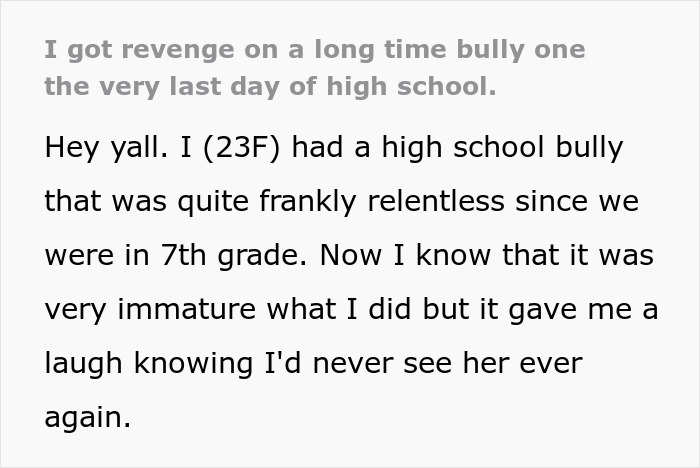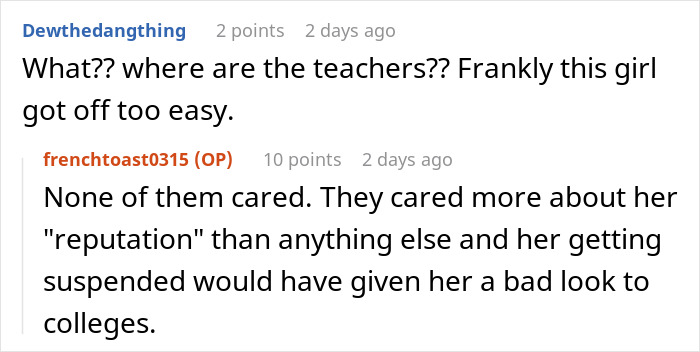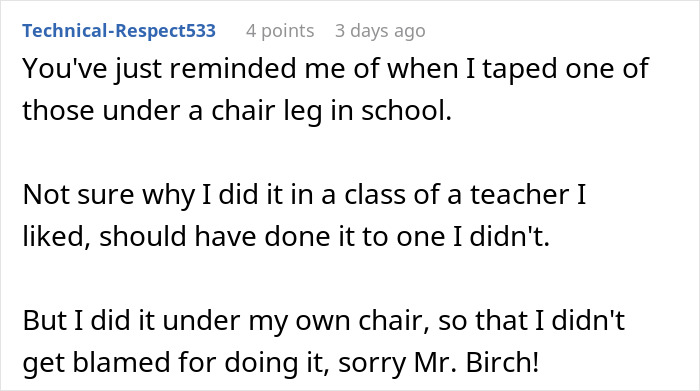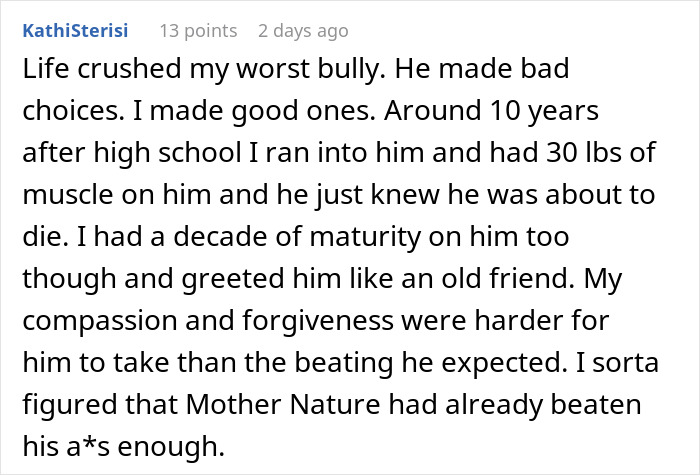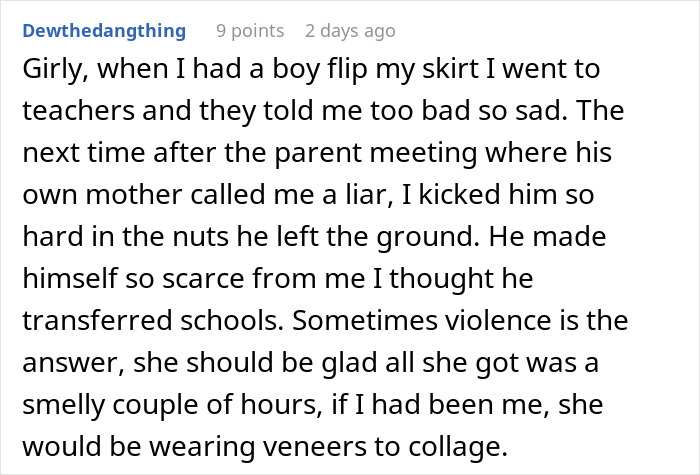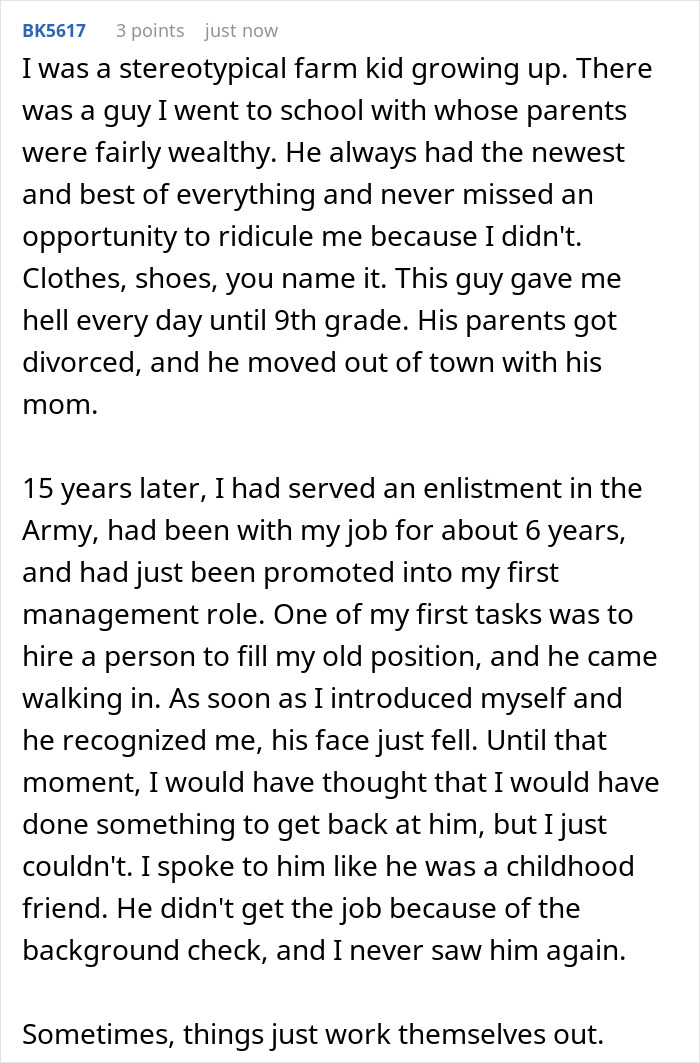Redditor FrenchToast0315 decided to do it on the last day of school. She chose to get back in petty revenge style, which made this day even more memorable for her longtime bully, but not in a good way. Scroll down to find the full story and a conversation with Kerry-Ann Williams, M.D., child, adolescent, and adult psychiatrist, who kindly agreed to speak on the topic of bullying.
Standing up to a bully might seem like the scariest thing in the world
Share icon Image credits: cottonbro studio / Pexels (not the actual photo)
But this woman did it, ruining the last day of school for the bully
Share icon Image credits: Phạm Anh / Pexels (not the actual photo)
Image credits: frenchtoast0315 Share icon Image credits: Pixabay / Pexels (not the actual photo)
“They may not even realize that what they are doing is technically considered bullying”
To understand better why bullying remains a big issue among young people, Bored Panda reached out to Kerry-Ann Williams, M.D., child, adolescent, and adult psychiatrist. She describes such torment as a choice to exploit someone who is in a vulnerable situation. She says that this inclination to be opportunistic rather than compassionate stems from several sources. “Sometimes individuals are taught, from a very early age, to be opportunistic,” Williams explains. “They may get positive feedback from the adults around them when they “trick” someone or when they win a fight.” Meanwhile, others struggle with insecurity that’s why they bully their peers. “They don’t feel very strong or capable in their everyday lives. So, when they come across someone who is more vulnerable or weaker than them, that’s the only time they feel strong or superior. Sometimes this occurs if a person has personally been bullied and made to feel inferior and weak by others.” Children can also consider pranks to be funny without understanding how the other person feels. “They may not even realize that what they are doing is technically considered bullying,” Williams says. “The other thing to consider is that we are living in a world that is becoming increasingly impersonal,” she adds. “There is so much that you can accomplish in your daily life without ever having to directly interact, in-person, with others. This can slowly erode the level of emotional connectedness that you have with other people. Relationships slowly start to become transactional. On top of that, social media allows you to conceal your identity when you engage. Increasingly young adults are given the message to take care of themselves (“self-care”) and to think about what others can do for them.”
Bullying is proven to have lasting negative effects on a person, both physical and emotional
Bullying is proven to have lasting negative effects on a person, both physical and emotional. Kids who are regularly tormented tend to experience a wide range of emotions, including anger, vulnerability, helplessness, frustration, and isolation. Feelings of low self-esteem often make it harder to find friends and interfere with maintaining healthy relationships. As they step into adulthood, some may resort to medications and alcohol to numb the pain. Others develop chronic illnesses like anxiety or depression. Kids’ academic performance also declines if they are bullied. In fact, it’s one of the first signs indicating that this is happening to them. They may also feel the need to skip classes or school to avoid being tormented. Eventually, children can develop “learned helplessness.” Meaning that the target of bullying gives up all efforts to change the situation. As a result, they start feeling hopeless, believing there’s no way out. Share icon Image credits: Barbara Olsen / Pexels (not the actual photo)
Parents should teach children to treat others with kindness and respect
Learning to stand up means that the bully’s action won’t have a long-term effect on their targets. However, Williams says that this may depend on the risk of the situation. ” If there is violence involved, then it may be unsafe to try to defend yourself. If it is a situation of coercion, then it depends on the leverage that person has and the consequences of releasing that. It’s all going to be case by case.” Standing up doesn’t necessarily call for confrontation or fighting with the tormentor, as it can be unsafe. Instead, what they can do is remain calm, don’t bully back, and try not to show any anger or tears. A good alternative is to tell them to stop or simply walk away. Afterward, they should immediately report the bullying to their teacher, parent, principal, or whoever they can trust and confide in. It’s important not to stay silent and to not let this happen regularly. It may also be beneficial to avoid being alone where there are no other students or teachers. Try eating in a group or sitting near the front of a bus. However, the best way to stop such oppression is to prevent it. Parents should educate their children about bullying before the child brings this topic to them. Some children have trouble understanding social signs and aren’t aware that what they are doing is hurtful. They should be taught to treat others with kindness and respect and to be aware that the opposite behavior isn’t tolerable. Parents should instill a sense of empathy in their kids for those of different races, genders, sexualities, religions, etc. The best way to do so is to lead by example, reinforcing positive behaviors instead of negative ones. Williams concludes, “If young people are in an environment where they are not being held accountable for their actions, then they will increasingly push the boundaries. In that way, supervision and accountability are factors that can help to mitigate the intensity and frequency of bullying.”
The author provided more information in the comments
Readers applauded author’s revenge
And shared similar stories
Anyone can write on Bored Panda. Start writing! Follow Bored Panda on Google News! Follow us on Flipboard.com/@boredpanda!

